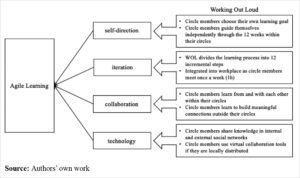Working Out Loud: an intervention study to test an agile learning method
Diese Studie ist aus mehreren Gründen interessant. Erstens wird in ihr agiles Lernen definiert: „Based on this previous research, we define four meta-principles characterizing agile learning: self-direction, iteration, collaboration and technology.“
Zweitens finden die Autor:innen in Working Out Loud genau diese Prinzipien agilen Lernens wieder: „Overall, WOL fits the characteristics of agile learning and might therefore provide a fruitful path to assess its contribution to professional learning.“
Und drittens gehen sie hin und untersuchen schließlich die Effekte von Working Out Loud: „This intervention study used a pre–post and six-month follow-up design (N = 507) to evaluate the effects of WOL on learners’ vigor (affective outcome), WOL behavior (behavioral outcome) and psychological empowerment (cognitive outcome) at work.“
Ihre Ergebnisse fassen die Autor:innen in ihrem Abstract wie folgt zusammen: „The authors compared the three longitudinal measurements using multilevel modeling. Results revealed that WOL could significantly increase learners’ WOL behavior and psychological empowerment at work in the post and six-month follow-up measurements. No effect was found on learners’ vigor at work.
This study highlights the need for research on new, more agile learning frameworks and discusses their relevance to the literature. Agile learning frameworks enable learners to be more autonomous and flexible, allowing them to better adapt to changing environmental demands.“

Die Untersuchung, das nur als Ergänzung, fand im Rahmen der WOL-Initiative #FrauenStärken 2021 statt.
Tabea Augner, Carsten C. Schermuly und Franziska Jungmann, Journal of Workplace Learning, 2024, Vol. 36, No. 1, pp. 43-58 (via ResearchGate)
Bildquelle: Tabea Augner, Carsten C. Schermuly und Franziska Jungmann